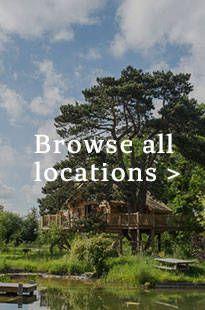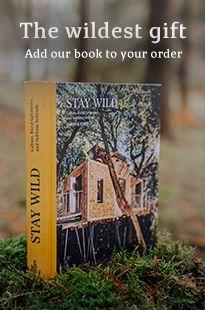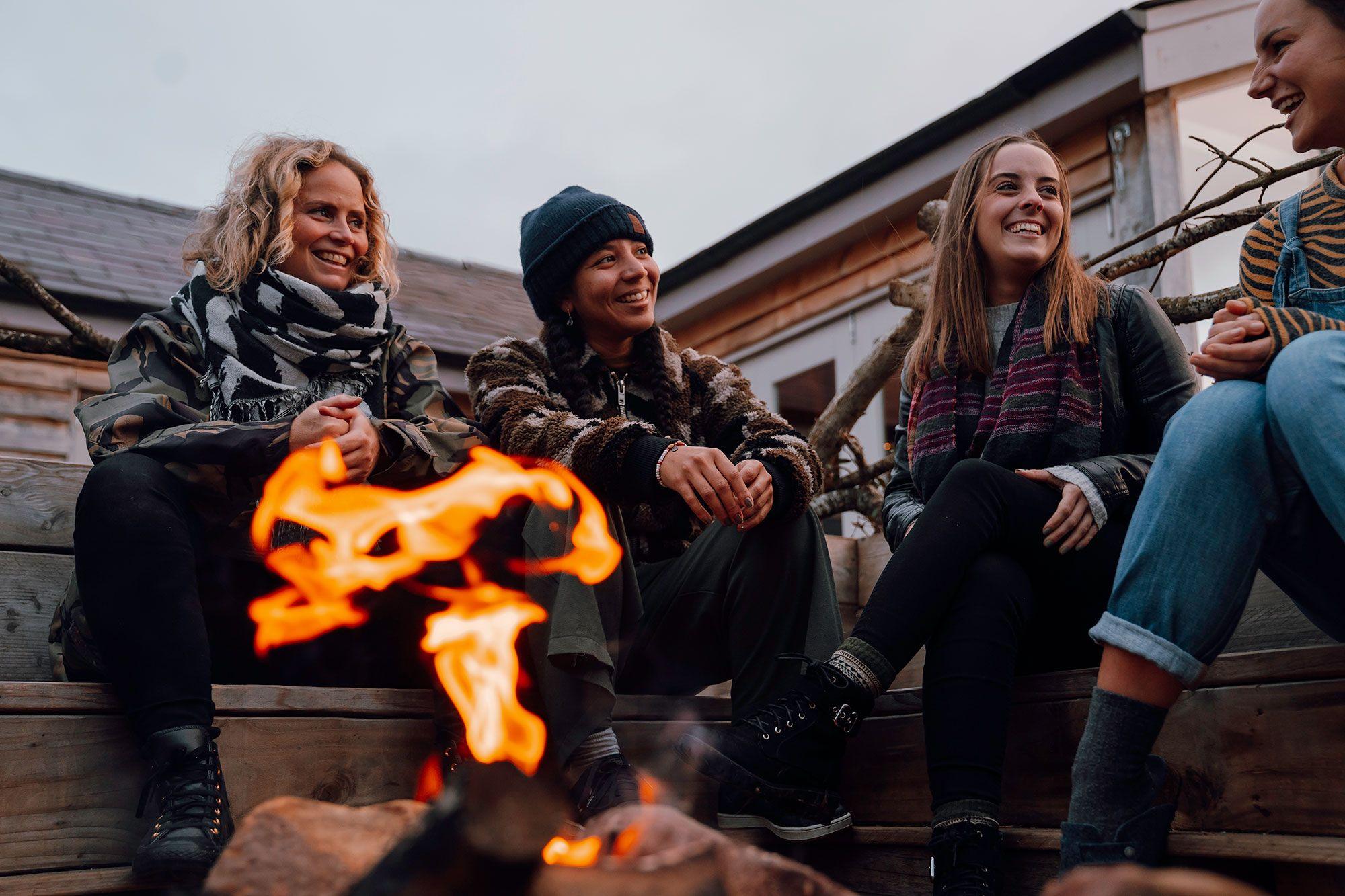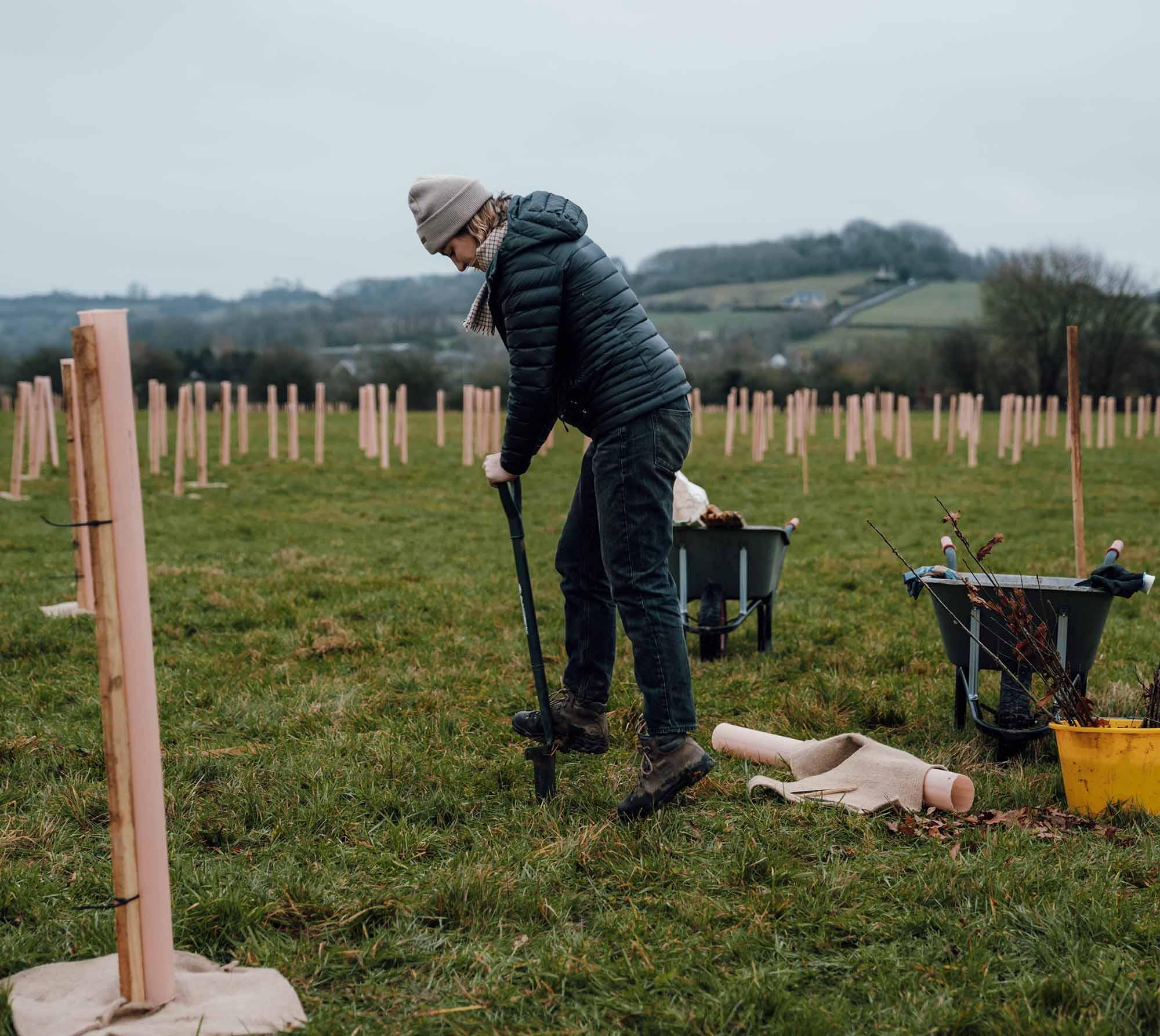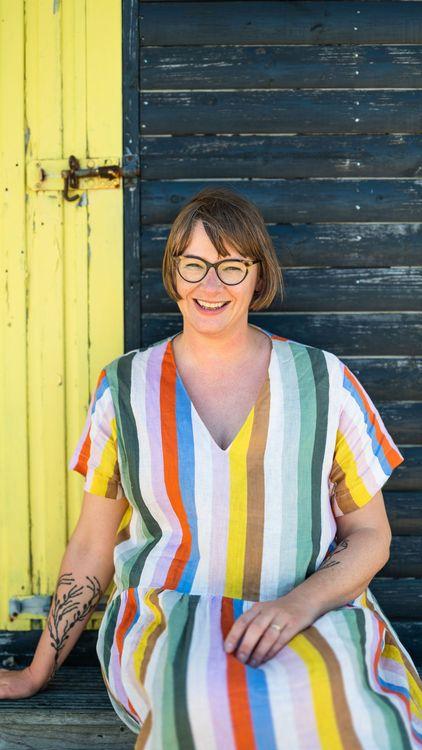
A Life More Wild - Series 3 Episode 7
Katherine May
Katherine May on the seafront in Whitstable, as she talks about inspiration, how much she'd like to buy a beach hut, and why we should all love winter.
A few years ago, a walk on the Southwest Coastal Path opened Katherine May up to a whole new world. She began to think about reconnecting with nature, and how it was the antidote to everything from anxiety to writer's block, she even shaped her best-selling book wintering around the elements.
You know I'm talking about breaking down. This ability to connect right down to its component parts and figuring out again. So, I worked my way through the elements from earth, water, fire and air, and they all made a different kind of sense. When I was thinking about the way we find meaning in the world.
Join Katherine now on the seafront in Whitstable, as she talks about inspiration, how much she'd like to buy a beach hut, and why we should all love winter.
I promised to take you to Whitstable beach, but I'm taking you by my favourite route, which is away from Whitstable beach first, that means going over the train line and then back over it again. And eventually, onto West Beach, which is our kind of furthest westerly Beach, which is often quite quiet, and it has the beach huts of my dreams on it. And it's my favourite part of Whitstable Beach, so you're gonna get the whole tour.
What I really like about this route is that you get to see these little flashes of sea, as you go along without quite meeting it, it's a good thing.
So Wintering is a book about surviving the fallow periods in life. So, it uses the metaphor of winter, to explore this very natural part of the human lifecycle that comes to all of us over and over again, where for a little while, we feel kind of shut out of the rest of the world, you know, it's probably in the aftermath of an illness, or a poor period of mental health or a big life event. But I increasingly think actually, it's often just the way we endure change, like really necessary change, but we often resist it. But that kind of takes us out of the world for a while. And it's really useful to think about how natural it is within the cycle of the year for us to, to withdraw, to have a more restful, regenerative time. And you know, maybe to reflect so that you can go back into the world, slightly more ready again. So, it's weird to talk about it midsummer, because it's like the opposite of this time of year. And I always feel like it's a very maligned season. And I think it's a shame that we talk so enthusiastically about summer, and how glorious it is, and almost hold our breath through winter, like it's this season that you have to just get through and ignore as much as possible. And I think I always wanted to write something about how beautiful I find winter. I mean, it's, it's something that I came to realise, when I moved here to Whitstable, that in winter the beach is incredible, and people avoid it. But it's got a different beauty. It's not like the summer but it's quiet and the winds blowing and the best thing you ever see here is when it snows on the beach and the whole scene turns white and it's just so amazing. And yeah, I think I really wanted to kind of write a defence of winter a little bit and, and to say what a shame it is to skip out a whole quarter of our lives and not notice what's going on out there in those times.
So, we're going over a railway bridge, the train's come past a while ago, but you get a really good view from up here. Out across to see sorta that way and over the beach huts towards Whitstable. And it's a really beautiful day actually, isn't it? The tide is very far out. And when the tide goes out at Whitstable it means that you'd get nowhere near that sea. And even if you walked out there now, it would be ankle deep and can't swim. But it's lovely, you get this lovely colourscape, I think when the tides out lovely pale yellows and blues.
We'll try and get down onto the beach and to set, there's some steps down at certain places. There we go, there's some steps. And I can show you the, because actually at this time of year, you get incredible wildflowers on West Beach. And some of it's quite rare. It's just really, really nice to see. So, this little stretch here is where I dream of owning a beach hut. They're perfect because they're right on the shingle. And it's quiet. Have a dog. Right, you got our first look at that look, that's so beautiful.
So, you can see there, the yellow flowers are horned puppies. They're quite a rare, native species, and they grow all over the beach here. They're lovely. But we also get loads of red and white valerian. And further on the beach, in big clouds. It's just so gorgeous. And it's just, you know, it's a wonderful place to be. This town is so busy today. And look how quiet is here. You have to walk a little way to get here, but it's so worth it. And this is my favourite place to swim. But very difficult to quite manage it, because the tide has to be really into swim here. So, you've got like a 30-minute window. If you catch it, right, it's great.
So, Enchantment is, I guess the follow up to Wintering. It's a book about how to reconnect with the world around you. And I think it makes a case for allowing ourselves to find the word magical again, even though this age seems so hard and so bleak. And I really feel that the only way we will save ourselves is to let ourselves feel that wandering connection again. But I wrote it from deep within burnout in the middle of the pandemic. And I had to really fight my way back to feeling an intuition again, you know, like feeling that calling towards being fascinated by the world. And I think the book really just takes you through my process of learning that and thinking about how we might gather back together again, when all of this is over. And it's not over yet unfortunately.
When I first moved here, I think around about this point, a storm came one day. And when the tide was out, you could see a shipwreck, it, the storm had kind of washed away the silt, and it revealed the deck and the flattened sides. And there were loads of broken blue and white china plates around it, that it had been carrying apparently. And then one day another storm came and covered it up again and can't find it now. But it was brilliant for a while, you could walk on the deck and it was parallel to that house there. That's how I remembered it because I went to see it a few times. Not there now but it was such a good thing. It was such like a special, special, special discovery. There's a ship further along. That's quite a famous archaeological find. But this one isn't so famous and it's, it didn't get preserved, I don't think but it was wonderful.
So, I set up to walk the Southwest Coastal Path when I was just about to turn 40. And I didn't really have a strong rationale for why, like, why I was doing it. It was just this yearning. I think for time on my own. I think I wanted to move my body. But as I began walking, I realised that there was this kind of thought process that was waiting to take place almost. As I walked, I realised that I was autistic, which was a huge life change for me. But also, I'd never had never walked like that before, I'd never spent that much time. Outdoors. And I always felt like I wasn't a very outdoorsy person. It's so funny, because now everyone comes to interview me and says, so you're, you know, you're someone that spends a lot of time outdoors. And it's true, but it was never true for me earlier in my life. And I feel like it was almost a training ground for me, to figure out how to get what I needed, which was peace. And also the rhythm of walking. I think he's so helpful for me, it really soothes me has this, you know, somatic effect on your body that, just climbing over the groynes as we're talking. This is walking in Whitstable, it's like running a hurdle race.
Yeah, so walking has this, you know, beautiful effect on the body. Somatically really comforting. And I needed it. I didn't know I needed it. I didn't know how to need it. But what I love about that book, what I'm proud of about that book, is that I didn't finish the walk. And it's a book about being a woman with a child, a young child and wanting to undertake a long walk and how difficult that is, and how organising yourself around that is very, very different to those like very heroic walking narratives that we've got used to, which is, you know, a lone person strides out and undertakes this impossible sounding walk and they do it. And I chose not to finish it for very important reasons. And I'm really glad to have disrupted that narrative a little bit too.
When I need to ground myself again, I come out for a walk. That's the walk I'm taking you on today, really, because I do walk to manage stress. And to help me think like, I don't think I really write very well at the table, think I really do my writing, but I'm walking and then I just dictate it afterwards. So yeah, I come round here a lot. And this is a great loop for me because it's about an hour, which is a perfect unit of time, it's predictable, which helps sometimes when you've got other things on. But I can no longer take my dog. And my dog has very strong ideas about the route that she'll walk on. And this is not the route she'll walk on. So, she started refusing to do this one. So, I have to do it on my own now, which is really annoying because when I got a dog, I thought the dog would walk with me like other dogs, but apparently, not my one!
Yeah. So, I moved to Whitstable in 2006. And I wrote about this in Electricity. But, I moved as a kind of refugee because I'd been struck by this terrible anxiety in my old house. That meant I couldn't go into my old house. And I couldn't unravel why, why I was feeling like that. And eventually, we decided to give up and move to the sea, which I'd always wanted to do. And it was funny, because yeah, I found it instantly soothing to live by the sea. We're about to pass actually the house we lived in when we first moved here. We rented a house right on the seafront, and I couldn't believe the magic of looking out my window in the middle of the night and seeing the beach, it was amazing. But we couldn't afford to stay in that house. So, after a while. I wasn't sure if I'd done the right thing. Like I'd always lived in the Medway Towns, which is very working class area of Kent and that felt really safe and familiar to me in lots of ways. And I felt like Whitstable was a bit posher than I was used to. I found the social scene harder to fathom. I didn't understand the, I don't know, like the form I guess. And also, I was used to living in a much more mixed area, like I was struck suddenly by how white it was and I hadn't noticed when I was coming here for days out and holidays and it seemed quite flat to me that culture. But I, you know, I've put down roots, but I don't think, I don't think I felt truly at home here until my son was born. And then you connect with people in a different way and your son starts, or your children start to have connections that transcend your own a bit more maybe. And I felt more knitted into the town then, and now I can't imagine moving away but it did. It wasn't instant for me. It surprised me and I did think about moving back to Rochester quite a few times. But sometimes it didn't.
I'd love that house. Honestly. I feel like they should give me that house. It's a lovely white weather boarded house where it looks like it's got an amazing sunroom cut into the roof. I'd love to just go in it. Just have a poke around. Nobody could blame me for that. Surely. But yeah, I felt like they should award me that house for something. I'm not sure what. Yeah, I don't think I've done enough good deeds.
Yeah, this time of year, there are these, these pink flowers that you can see in white that are the same. And they've valerian. And we use the root to get to sleep, I think, and that goes all over the beach. And it's just the most amazing cloud of fluffy flower. But yeah, there's some, some lovely purple clover. And the Alexander's are now a little tired, they're drying out. They're just seed heads. I was hoping to find you some Viper's-bugloss, but I think it's further over that end of the beach. But that's gorgeous, because it has these really intense blue spikes of flower. Always nice to see. Some red poppies, lots of different grasses. It's just I think it's unusual to see a beach that's green, actually, which is what you get for very short time this time of year. You can see it's browning off now, it's going. But spring really breaks out on this beach. And there are plants growing all over it. And it always feels so fresh in the late spring when it's all grown up.
And as we're coming to the end of our walk, you can see how busy the centre of town is. It's quite shocking after going out on our own for a little while, like here's all the people again. It's, it's that time of year, unfortunately. But it does bring the town to life, I can't grumble too much. I used to come here and enjoy myself too. So, other people are entitled. So, I feel like that's my own personal route that that I always take, like I don't ever take anyone with me really. I used to take my son along there when we were all in lockdown. And that was the only route we could take really, that lasted about the right amount of time. But it's really nice to share it. I feel like it's different every time I go there's always something new to notice. There's always a new plant that's come out or a new sight to see. And I just love those little glimpses you get of the beach, as you go along. And the fact that you walk back across the actual beach, like it feels like a homecoming.
How Katherine's connection to nature has helped her is a lesson for anyone struggling with their mental health. Even a short walk and a bit of fresh air can give you a little boost. You could however, go even further, like our guest next time, Freya Bromley. Her struggle with a huge personal loss led her to the mission of swimming in every tidal pool in Britain. You'll join her for a walk, and maybe a swim, at one of her favourite pools to talk grief, intimacy, and finding calm spaces in rough seas. If you haven't already, give us a follow on your podcast app. Tell a friend about the podcast and check out @Canopy&stars on Instagram to see footage and photos from our days out recording.

